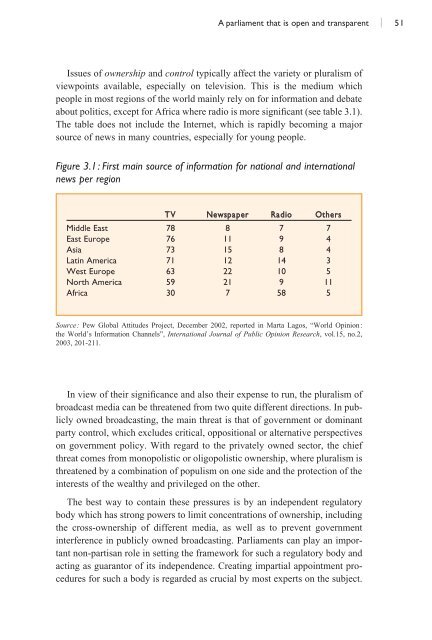PARLIAMENT AND DEMOCRACY - Inter-Parliamentary Union
PARLIAMENT AND DEMOCRACY - Inter-Parliamentary Union
PARLIAMENT AND DEMOCRACY - Inter-Parliamentary Union
Create successful ePaper yourself
Turn your PDF publications into a flip-book with our unique Google optimized e-Paper software.
A parliament that is open and transparent I 51<br />
Issues of ownership and control typically affect the variety or pluralism of<br />
viewpoints available, especially on television. This is the medium which<br />
people in most regions of the world mainly rely on for information and debate<br />
about politics, except for Africa where radio is more significant (see table 3.1).<br />
The table does not include the <strong>Inter</strong>net, which is rapidly becoming a major<br />
source of news in many countries, especially for young people.<br />
Figure 3.1: First main source of information for national and international<br />
news per region<br />
TV Newspaper Radio Others<br />
Middle East 78 8 7 7<br />
East Europe 76 11 9 4<br />
Asia 73 15 8 4<br />
Latin America 71 12 14 3<br />
West Europe 63 22 10 5<br />
North America 59 21 9 11<br />
Africa 30 7 58 5<br />
Source: Pew Global Attitudes Project, December 2002, reported in Marta Lagos, “World Opinion:<br />
the World’s Information Channels”, <strong>Inter</strong>national Journal of Public Opinion Research, vol.15, no.2,<br />
2003, 201-211.<br />
In view of their significance and also their expense to run, the pluralism of<br />
broadcast media can be threatened from two quite different directions. In publicly<br />
owned broadcasting, the main threat is that of government or dominant<br />
party control, which excludes critical, oppositional or alternative perspectives<br />
on government policy. With regard to the privately owned sector, the chief<br />
threat comes from monopolistic or oligopolistic ownership, where pluralism is<br />
threatened by a combination of populism on one side and the protection of the<br />
interests of the wealthy and privileged on the other.<br />
The best way to contain these pressures is by an independent regulatory<br />
body which has strong powers to limit concentrations of ownership, including<br />
the cross-ownership of different media, as well as to prevent government<br />
interference in publicly owned broadcasting. Parliaments can play an important<br />
non-partisan role in setting the framework for such a regulatory body and<br />
acting as guarantor of its independence. Creating impartial appointment procedures<br />
for such a body is regarded as crucial by most experts on the subject.

















